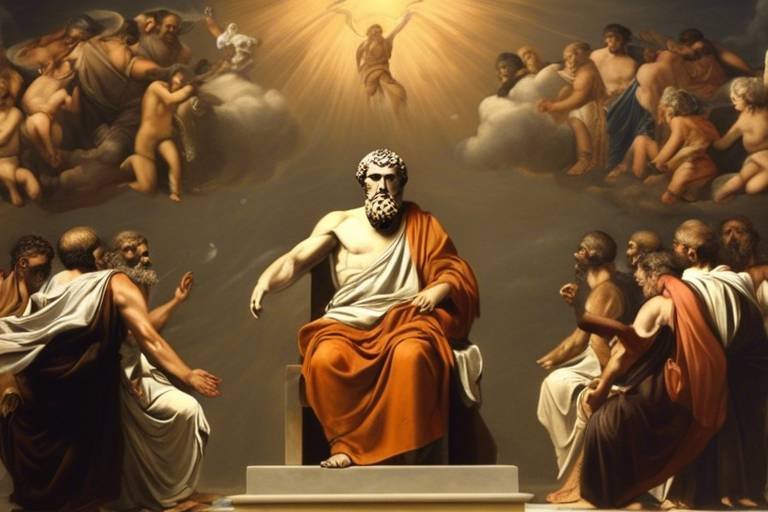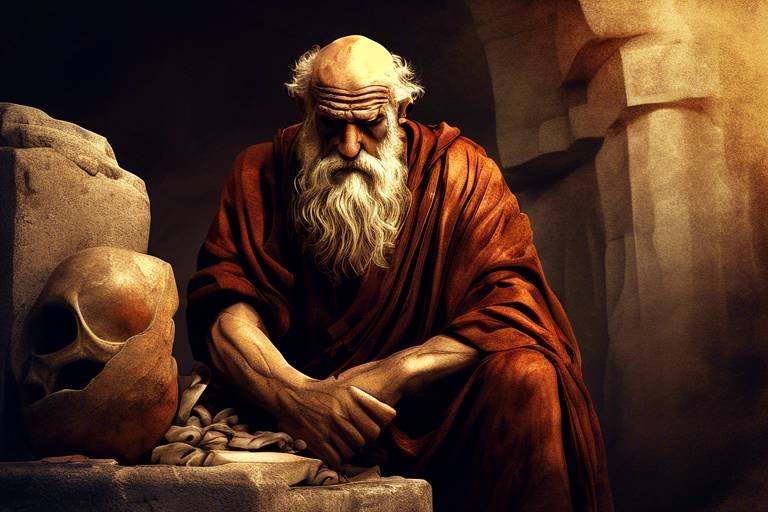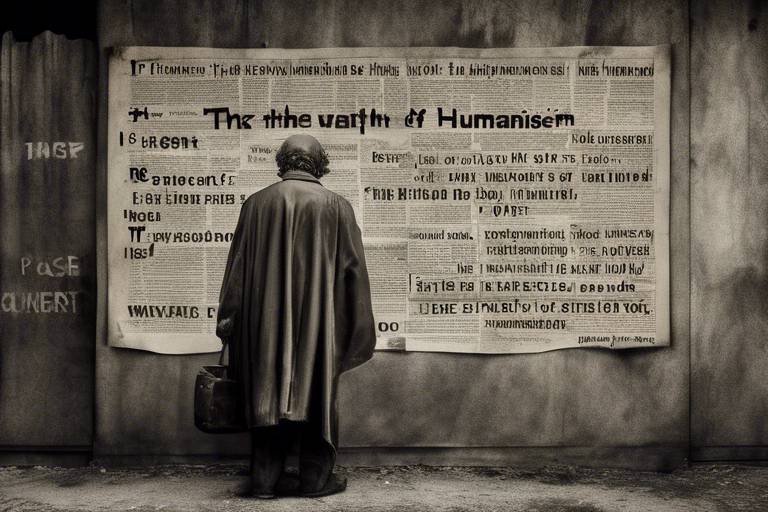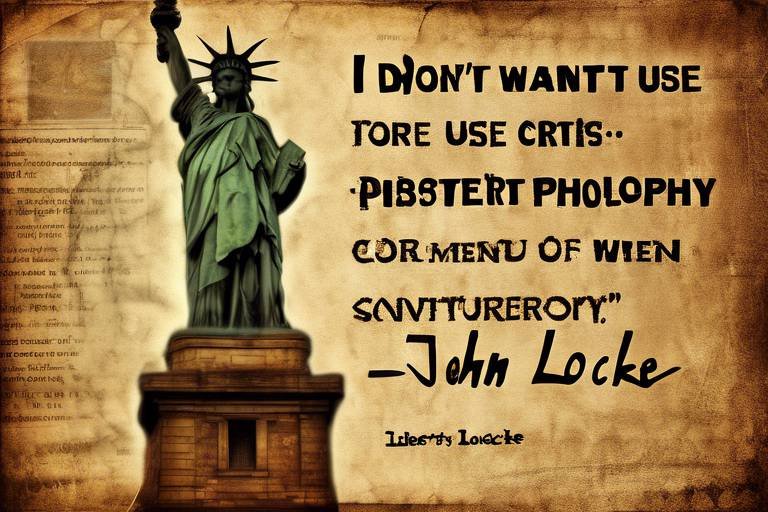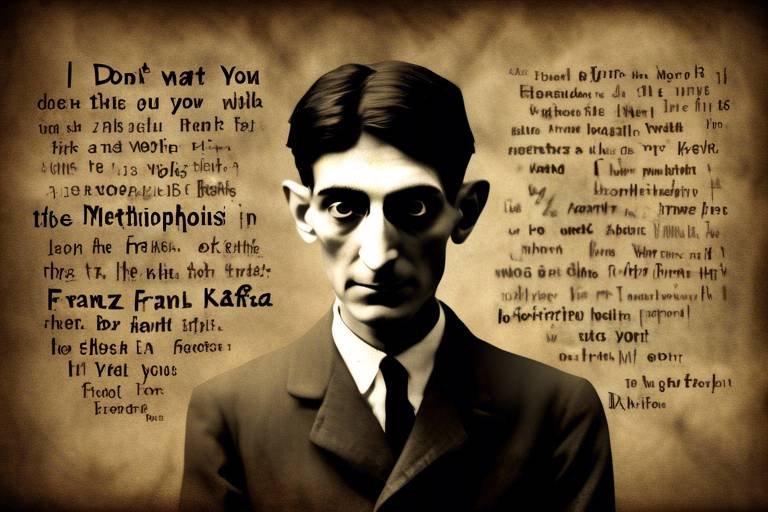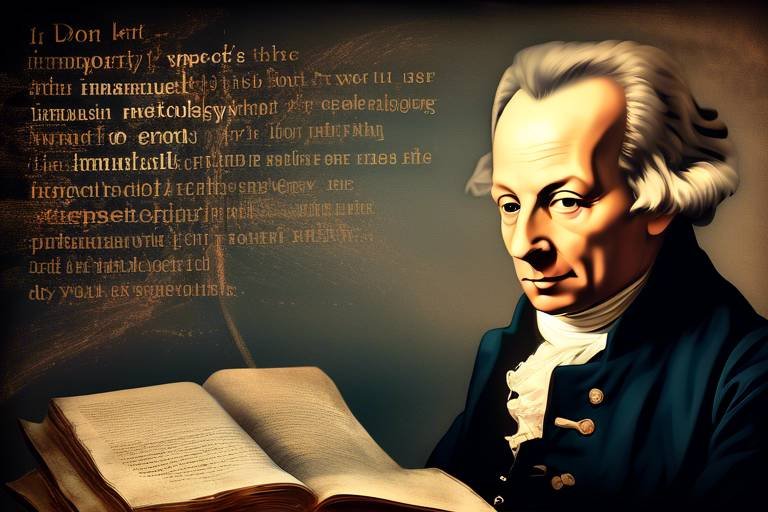Unlocking Sartre’s Existentialism and Its Notions of Freedom
Jean-Paul Sartre, one of the most influential philosophers of the 20th century, opened the door to a world where freedom and responsibility are not just abstract concepts but the very essence of our existence. In his existential philosophy, Sartre challenges us to confront the raw reality of our choices and the implications they carry. Imagine standing at a crossroads, where each path represents a different choice, and the weight of that decision hangs heavily in the air. This is the crux of Sartre’s thought—our existence is defined by our freedom to choose, and with that freedom comes the burden of responsibility. In this article, we will delve into Sartre's existentialism, exploring how his ideas about freedom shape our understanding of the human condition and its relevance in today’s society.
At its core, existentialism is about the individual. Sartre posits that our existence precedes our essence, meaning that we are not born with a predetermined purpose or identity. Instead, we are shaped by our experiences and choices. This idea invites us to reflect on our personal journey—how many times have you felt lost, searching for meaning in a chaotic world? Sartre encourages us to embrace our unique experiences as the building blocks of our identity. By recognizing our individuality, we can begin to understand the profound freedom that exists within us. This freedom is not just about making choices; it’s about owning those choices and understanding their impact on our lives and the lives of others.
Sartre famously asserted that “man is condemned to be free.” This provocative statement encapsulates the paradox of freedom—it is both a gift and a curse. With the ability to choose comes the weight of responsibility for those choices. Imagine a juggler skillfully keeping multiple balls in the air; each ball represents a decision, and dropping one can lead to chaos. Sartre argues that we cannot escape this responsibility; it is an inescapable part of our existence. We are not only accountable for our actions but also for the choices we make on behalf of others. This profound sense of responsibility can often lead to feelings of existential dread, as we grapple with the consequences of our decisions and the realization that we are the architects of our own lives.
Every choice we make carries weight and consequences, shaping our identity and influencing our path. Sartre believed that our decisions define us; they are the brushstrokes on the canvas of our lives. Think of it like a game of chess—every move you make not only impacts your position but also the overall outcome of the game. This idea can be daunting, as it forces us to confront the reality that our choices are significant and irreversible. The existential dread that accompanies this realization can be overwhelming, but it also serves as a powerful motivator to live authentically and with intention.
To live authentically, Sartre argues, we must engage in conscious decision-making. This means recognizing our freedom and the responsibility that accompanies it. Authenticity is about being true to ourselves and our values, rather than conforming to societal expectations or external pressures. Imagine peeling back the layers of an onion; each layer represents the influences and expectations imposed upon us, and at the core lies our true self. By embracing our freedom and making choices aligned with our authentic selves, we can live a more fulfilling and meaningful life.
Sartre introduces the concept of bad faith, which refers to the self-deception individuals engage in to escape the responsibility of their freedom. It’s like wearing a mask to hide our true selves; we convince ourselves that we have no choice, that we are merely products of our circumstances. This denial of freedom can manifest in various ways, from staying in a job we hate to avoid the uncertainty of change, to conforming to societal norms that stifle our individuality. By recognizing and confronting our bad faith, we can reclaim our freedom and take ownership of our lives.
Freedom is not just a personal journey; it extends into the social realm. Sartre's ideas about freedom challenge us to consider how our choices impact others and the structures of society. Just as a pebble thrown into a pond creates ripples, our actions can influence the lives of those around us. This interconnectedness highlights the importance of social responsibility and the need to recognize the freedom of others. By fostering a society that values individual freedom while acknowledging our collective responsibility, we can create a more equitable and compassionate world.
In Sartre's philosophy, the presence of others plays a crucial role in shaping our identity. Our interactions with others can either enhance or restrict our freedom. Think of it as a dance; when we engage with others, we must navigate their perspectives and expectations, which can sometimes lead to tension and conflict. Yet, these interactions are also opportunities for growth and self-discovery. By understanding how we are perceived by others, we can gain valuable insights into our own identity and the choices we make.
Sartre’s concept of “the look” describes how being perceived by others affects our sense of self. When someone looks at us, we become aware of our existence as an object in their eyes, which can lead to feelings of vulnerability and objectification. Imagine standing on a stage, exposed to the audience's gaze; this awareness can be both empowering and disempowering. It reminds us that our freedom is intertwined with the perceptions of others, challenging us to navigate our identity in a complex social landscape.
Finally, Sartre suggests that our relationships can either restrict or enhance our freedom. Healthy relationships foster mutual respect and understanding, allowing both individuals to thrive. However, toxic relationships can stifle our growth and autonomy. It’s essential to evaluate the connections we cultivate and ensure they align with our values and aspirations. Just as a garden flourishes with the right care, our relationships can either nourish or hinder our existential journey.
- What is existentialism? Existentialism is a philosophical movement that emphasizes individual existence, freedom, and choice.
- How does Sartre define freedom? Sartre views freedom as the ability to make choices and the responsibility that comes with those choices.
- What is bad faith? Bad faith is a form of self-deception where individuals deny their freedom and responsibility.
- How does Sartre's philosophy relate to social responsibility? Sartre's ideas encourage individuals to consider how their choices impact others and the structures of society.

The Essence of Existentialism
Existentialism is not just a philosophical doctrine; it’s a way of understanding our existence in a world that often seems chaotic and indifferent. At its core, existentialism emphasizes the importance of individual existence, freedom, and choice. Jean-Paul Sartre, one of the most prominent figures in this movement, challenges us to confront the reality of our existence and the weight of our decisions. He posits that we are not merely products of our environment or predetermined paths; rather, we are the architects of our own lives, shaping our identity through our actions and choices.
To grasp the essence of existentialism, we must first appreciate the idea that “existence precedes essence.” This means that, unlike a manufactured object that has a predetermined purpose, human beings are born without any inherent meaning. We come into this world as blank slates, and it is through our experiences and choices that we carve out our identities. Think of it like a blank canvas; it’s up to us to paint our own masterpiece, using the colors of our experiences, emotions, and decisions.
Moreover, Sartre emphasizes the significance of personal experience in understanding oneself. He believes that our subjective experiences are vital in shaping our identity. In a world that often tries to impose labels and roles upon us, existentialism encourages us to break free from societal expectations and to define ourselves on our own terms. This can be incredibly liberating but also daunting, as it places the responsibility squarely on our shoulders.
In Sartre’s view, the essence of being human is rooted in our ability to make choices. However, this freedom is a double-edged sword. While it allows us to pursue our desires and ambitions, it also comes with the heavy burden of responsibility. Each choice we make not only reflects who we are but also shapes our future. This is where existentialism becomes particularly relevant in contemporary society. In a world filled with distractions and expectations, the challenge lies in navigating our freedoms while remaining true to ourselves.
Ultimately, Sartre's existentialism invites us to embrace our freedom, but it also demands that we acknowledge the weight of our choices. It’s a call to action, urging us to live authentically and to engage with our existence fully. By understanding the essence of existentialism, we can begin to appreciate the profound impact of our choices on our identity and the world around us.
- What is the main idea of existentialism?
Existentialism focuses on individual freedom, choice, and the subjective nature of existence. It posits that we create our own meaning in life through our actions and decisions. - How does Sartre define freedom?
Sartre defines freedom as the ability to make choices without external constraints. However, this freedom comes with the responsibility of facing the consequences of those choices. - What does "existence precedes essence" mean?
This phrase means that individuals are not born with a predetermined purpose; rather, they create their own essence through their choices and experiences.

Freedom and Responsibility
When we think about freedom, it often feels like a double-edged sword, doesn’t it? On one hand, we crave the ability to make our own choices, to steer our lives in the direction we desire. On the other hand, with that freedom comes a heavy burden—responsibility. Jean-Paul Sartre, a titan of existential philosophy, delves deep into this intricate relationship between freedom and responsibility, arguing that they are inseparable. According to Sartre, every choice we make not only defines who we are but also shapes the world around us. It’s a profound realization that can be both liberating and terrifying.
Imagine standing at a crossroads, with various paths stretching out before you. Each path represents a different choice, a different future. The freedom to choose is exhilarating, but it also means you must take ownership of the consequences that follow. Sartre posits that we are condemned to be free; that is, we cannot escape the responsibility that accompanies our choices. This existential freedom is not just about choosing what to have for breakfast or what movie to watch; it extends to the very essence of our lives and our moral obligations towards others.
To illustrate this concept, consider the following table, which outlines the relationship between freedom, choice, and responsibility:
| Aspect | Description |
|---|---|
| Freedom | The ability to make choices without external constraints. |
| Choice | The act of selecting one option over others, which reflects our values and beliefs. |
| Responsibility | The obligation to accept the consequences of our choices and actions. |
Now, let’s consider the implications of this relationship. When we make a choice, we are not just affecting our own lives; we are impacting the lives of others as well. This ripple effect is a crucial aspect of Sartre's philosophy. For instance, if you choose to pursue a career that harms the environment, your freedom to choose that path comes at the cost of responsibility towards the planet and future generations. It’s a stark reminder that our actions are intertwined with the fabric of society, and we must navigate this web of interconnectedness with care.
Moreover, Sartre emphasizes the importance of **authenticity** in our choices. Authenticity means being true to oneself and making decisions that genuinely reflect our values rather than conforming to societal expectations. When we act authentically, we embrace our freedom fully, acknowledging that we are the architects of our own lives. This can be challenging, especially in a world that often pressures us to fit into predefined molds. Yet, it is through authentic choices that we can truly exercise our freedom while embracing the responsibility that comes with it.
In discussing freedom and responsibility, it is essential to acknowledge the concept of **bad faith**. Sartre describes bad faith as a form of self-deception, where individuals deny their freedom and responsibility by blaming external forces for their choices. For example, someone might say, "I had no choice; my boss made me work late," thus avoiding accountability. This denial not only limits personal growth but also undermines the very essence of freedom. Recognizing and confronting bad faith is vital for anyone seeking to live an authentic life.
Ultimately, the interplay between freedom and responsibility is a fundamental aspect of the human experience. It challenges us to reflect on our choices, to embrace our freedom, and to accept the weight of our decisions. Sartre's insights remind us that while we may feel overwhelmed by the responsibility that comes with freedom, it is also what makes us truly human. By acknowledging this relationship, we can navigate our lives with greater awareness and intention, shaping not just our destinies but also the world around us.
- What is Sartre's main argument about freedom? Sartre argues that freedom is inherent to human existence, and with it comes the responsibility for our choices.
- How does bad faith relate to freedom? Bad faith is a denial of one's freedom and responsibility, as individuals deceive themselves to avoid accountability for their actions.
- Why is authenticity important in Sartre's philosophy? Authenticity allows individuals to make choices that reflect their true selves, embracing both their freedom and the associated responsibilities.
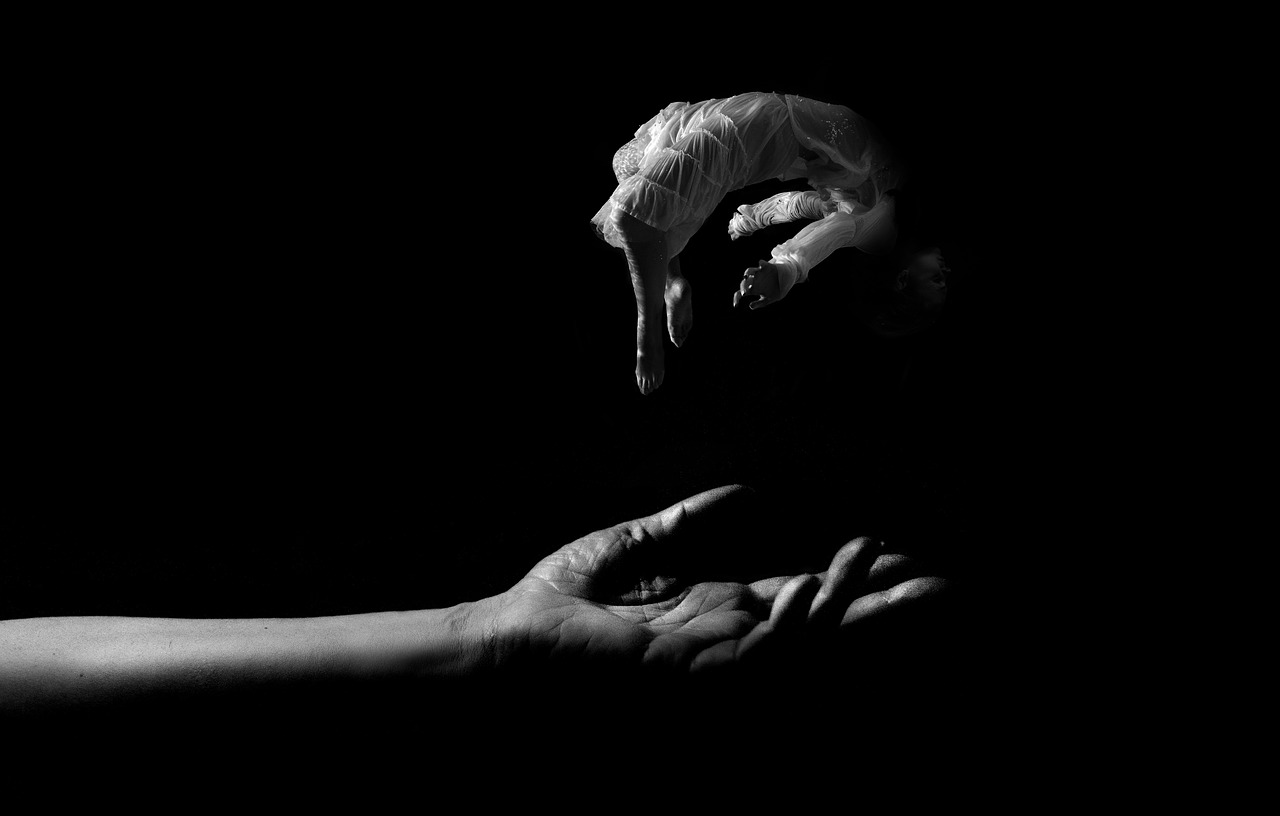
The Weight of Choices
When it comes to the philosophy of Jean-Paul Sartre, one of the most profound ideas he presents is the notion that every choice we make carries a significant weight. Imagine standing at a crossroads, each path representing a different decision. The weight of that choice isn't just about the direction you take; it's about the essence of who you are becoming with each step. Sartre posits that our choices are not merely options but are fundamental to our identity. This heavy realization can often lead to what he describes as existential dread—a feeling that can be as paralyzing as it is enlightening.
Consider this: every decision you make, from the trivial to the monumental, shapes your reality and your self-perception. For example, choosing a career path isn't just about financial stability; it's about aligning with your values and aspirations. Each choice is a brushstroke on the canvas of your life, and together they create a masterpiece that is uniquely yours. But what happens when we fail to acknowledge the weight of these choices? We risk living inauthentically, drifting through life without a true sense of purpose.
To illustrate this point, let's take a look at a simple table that summarizes the impact of different types of choices:
| Type of Choice | Impact on Identity | Examples |
|---|---|---|
| Personal Choices | Shapes individual values and beliefs | Choosing a hobby, lifestyle, or partner |
| Professional Choices | Affects social status and self-worth | Career selection, workplace ethics |
| Moral Choices | Defines ethical framework and conscience | Deciding to help others, standing up for beliefs |
As you can see, the choices we make can have a ripple effect, not just on our lives but on those around us. Sartre believed that this weight comes with a responsibility to ourselves and to others. When we make decisions, we are not only crafting our own destinies but also influencing the lives of those who intersect with ours. This interconnectedness emphasizes the need for conscious decision-making, where we actively consider the implications of our choices rather than allowing life to happen to us.
Ultimately, embracing the weight of our choices can lead to a more authentic existence. It encourages us to reflect on our motivations and the consequences of our actions. By acknowledging this weight, we can steer our lives in directions that resonate with our true selves, fostering a sense of fulfillment and purpose. So, the next time you find yourself at a crossroads, remember: your choice is not just a decision; it’s a declaration of who you choose to be.
- What does Sartre mean by "existential dread"?
Existential dread refers to the anxiety and discomfort that arises from the realization of one's freedom and the weight of choices. - How can I make more authentic choices?
To make authentic choices, reflect on your values, consider the consequences of your actions, and embrace your freedom responsibly. - Why is freedom important in Sartre's philosophy?
Freedom is crucial because it empowers individuals to shape their own identities and make meaningful choices in their lives.
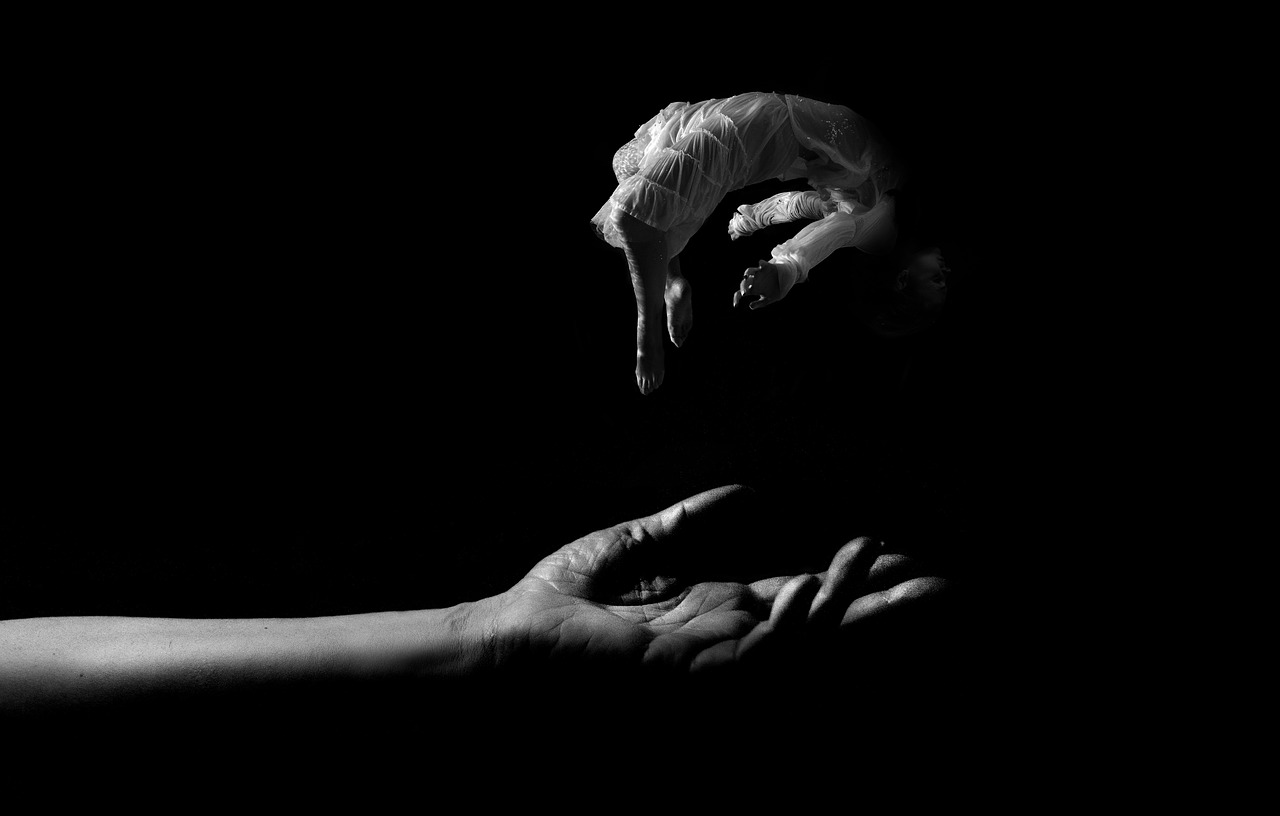
Authenticity in Decision-Making
In the realm of existentialism, authenticity is not just a buzzword; it's a fundamental principle that Jean-Paul Sartre champions with fervor. To him, authenticity means living in accordance with one's true self and values, rather than conforming to societal expectations or external pressures. Imagine standing at a crossroads, where each path represents a different choice. The essence of authenticity lies in your ability to choose the path that resonates with your inner self, even if it diverges from what others might deem acceptable. This journey toward authenticity requires a deep understanding of who you are and what you stand for.
But how do we achieve this authenticity in our decision-making? Sartre posits that it begins with conscious awareness of our freedom. Each decision we make is a reflection of our identity and values, and recognizing this freedom is the first step toward living authentically. It's like having a toolbox at your disposal; the more aware you are of the tools (or choices) you have, the better equipped you are to build a life that truly reflects who you are. This awareness can be cultivated through self-reflection, questioning societal norms, and understanding the motivations behind our choices.
However, the path to authenticity is often fraught with challenges. Many people find themselves caught in the web of external expectations, leading them to make decisions that do not align with their true selves. Sartre refers to this as living in "bad faith," where individuals deceive themselves into believing they have no choice. To combat this, it's essential to embrace the discomfort that comes with making authentic choices. This discomfort is a sign that you are breaking free from the chains of conformity and stepping into your own power.
To illustrate the importance of authenticity in decision-making, consider the following scenarios:
- Career Choices: Choosing a profession based on passion rather than societal pressure can lead to a more fulfilling life.
- Relationships: Engaging in relationships that resonate with your values ensures deeper connections and personal growth.
- Personal Beliefs: Upholding your beliefs, even when they are unpopular, showcases strength and authenticity.
Ultimately, authenticity in decision-making is about aligning your choices with your true self. It’s an ongoing process of self-discovery and courage. As Sartre puts it, "Man is condemned to be free." This means that the burden of choice is both a gift and a responsibility. By embracing your freedom and making conscious decisions, you can live authentically, shaping a life that is uniquely yours.
- What is authenticity in existentialism? Authenticity refers to living in alignment with one's true self and values, rather than conforming to external pressures.
- How can I achieve authenticity in my decisions? Achieving authenticity involves self-reflection, questioning societal norms, and embracing the discomfort that comes with making choices true to yourself.
- What is bad faith? Bad faith is a concept where individuals deceive themselves to escape the responsibility of making authentic choices.
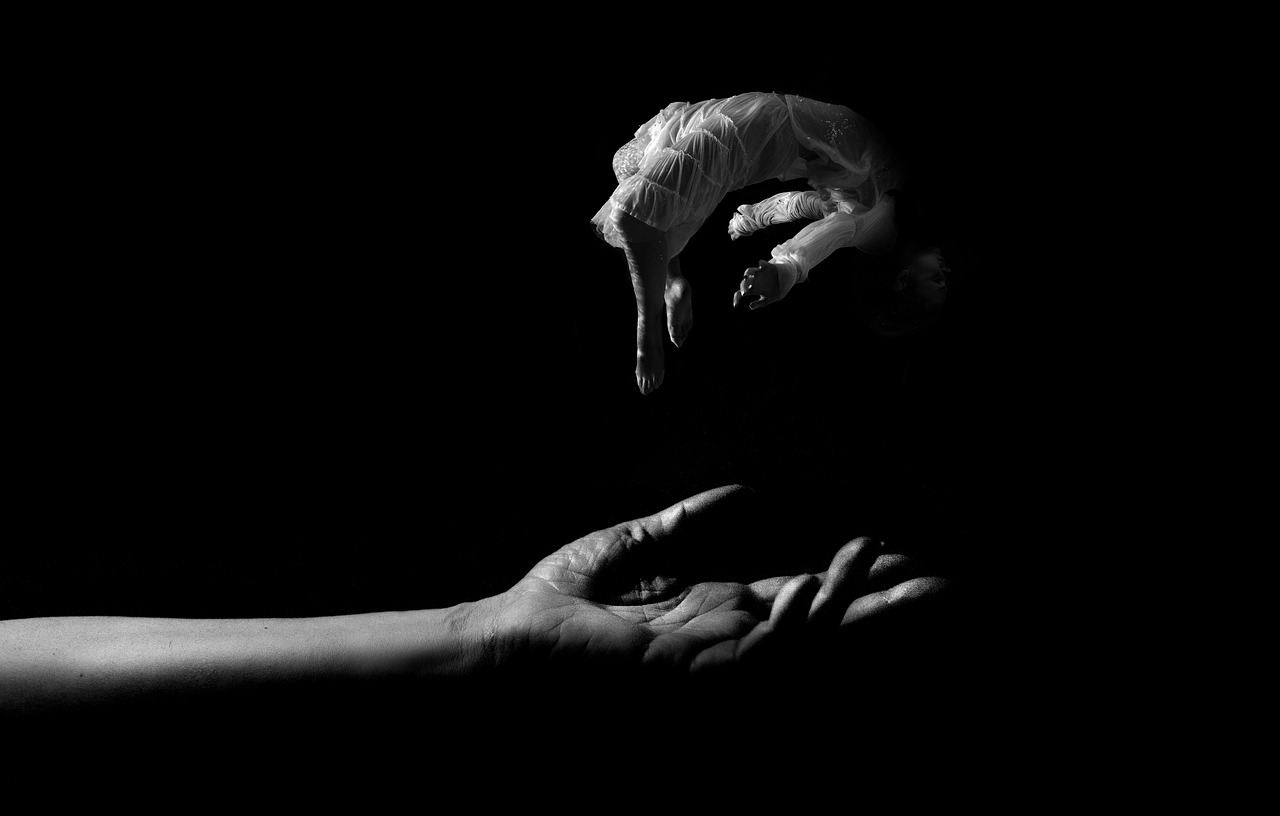
Bad Faith: A Denial of Freedom
In the realm of existentialism, Jean-Paul Sartre introduces the compelling concept of bad faith, which serves as a crucial lens through which we can examine the human tendency to escape the burden of freedom. Bad faith, in essence, is a form of self-deception; it is the act of lying to oneself to avoid the anxiety that comes with absolute freedom and the weight of responsibility. Imagine standing at a crossroads, where every path represents a choice that could lead to a drastically different life. Instead of embracing the uncertainty and potential of these choices, many of us might opt to ignore the paths altogether, convincing ourselves that we have no choice but to follow a predetermined route. This is the crux of bad faith—denying our freedom by adhering to external expectations or societal norms that dictate our actions.
Sartre argues that bad faith manifests in various forms, often stemming from our interactions with the world around us. For instance, consider the employee who feels trapped in a mundane job. Instead of acknowledging their dissatisfaction and taking steps to change their situation, they might convince themselves that they are simply “stuck” due to circumstances beyond their control. This denial not only hinders personal growth but also perpetuates a cycle of unhappiness and discontent. In Sartre’s view, this is a profound betrayal of one’s authentic self, as individuals choose to live in a state of illusion rather than confront the reality of their freedom.
The implications of bad faith extend beyond personal experiences; they seep into our social interactions and relationships. When we engage in bad faith, we often project our insecurities onto others, leading to toxic dynamics. For example, a person who refuses to acknowledge their own freedom might attempt to control those around them, fearing that if they accept their own choices, they must also confront the choices of others. This creates a paradox where the quest for freedom ironically leads to the restriction of it, both for oneself and for others.
To illustrate the concept of bad faith further, let’s consider a few common scenarios where individuals might fall into this trap:
- Conformity: Adopting societal norms without question, leading to a life that feels unfulfilling.
- Victimhood: Believing oneself to be a victim of circumstances, thereby relinquishing personal agency.
- Rationalization: Justifying poor decisions by blaming external factors, rather than acknowledging one’s role in the outcome.
Sartre’s exploration of bad faith serves as a powerful reminder of the importance of embracing our freedom, however daunting it may seem. By confronting our choices and the responsibilities that accompany them, we not only honor our authentic selves but also pave the way for genuine connections with others. The journey towards authenticity is fraught with challenges, but it is ultimately a liberating experience that allows us to reclaim our agency in a world that often encourages conformity.
In conclusion, understanding bad faith is essential for anyone seeking to navigate the complexities of existence. It urges us to question our motivations and the societal pressures that influence our decisions. By recognizing and overcoming bad faith, we can fully embrace our freedom and live authentically, shaping our lives according to our true desires rather than the expectations of others.

Social Implications of Freedom
When we think about freedom, it’s easy to get lost in the idea of individual choice and personal autonomy. However, Sartre pushes us to consider that freedom isn't just a solo act; it’s a social phenomenon that ripples through our communities and relationships. In essence, our freedom is intertwined with the freedom of others. This interconnectedness can lead to a profound understanding of how our choices affect not just ourselves but also the world around us.
Imagine freedom as a vast ocean. Each individual is like a wave, rising and falling, but the waves cannot exist in isolation. They interact, collide, and sometimes even create powerful currents. Sartre suggests that our freedom is similarly shaped by the societal structures we inhabit. For instance, when we make decisions, we must consider the impact on others. Are we promoting their freedom, or are we inadvertently restricting it? This duality of freedom is crucial because it reminds us that our actions have consequences that extend beyond our immediate sphere.
Furthermore, Sartre’s philosophy sheds light on the concept of collective responsibility. In a society where individuals are free, there comes a duty to ensure that the freedom of one does not trample on the freedom of another. This balance is delicate and requires constant vigilance. When we neglect our social responsibilities, we risk creating an environment where freedom becomes a privilege for some and a burden for others.
To illustrate this point, consider a few scenarios:
- Workplace Dynamics: In a corporate setting, an employee's freedom to express ideas can either foster innovation or lead to conflict, depending on how others respond.
- Community Engagement: A community event can either unite people and enhance their freedoms or create divisions if certain voices are excluded.
- Political Structures: Laws designed to protect individual freedoms must also account for the collective good, ensuring that no one is left behind.
These examples highlight how our personal freedoms are often at odds with societal expectations and norms. The challenge lies in navigating this complex landscape where individual desires meet collective needs. Sartre’s existentialism urges us to embrace this complexity, encouraging us to engage with others thoughtfully and authentically. By doing so, we can create a society that respects individual freedoms while also nurturing a sense of community and shared responsibility.
In conclusion, the social implications of freedom are vast and multifaceted. They remind us that while we may strive for personal autonomy, true freedom can only be realized in a context where we acknowledge and respect the freedoms of others. As we navigate our existence, let us remember that our choices shape not only our own lives but also the fabric of society itself.
- What is Sartre's view on freedom?
Sartre believes that freedom is a fundamental aspect of human existence, and it comes with the weight of responsibility. - How does freedom relate to social structures?
Freedom is not just individual; it is social. Our choices influence others, and we must consider the implications of our actions. - What is 'bad faith' in the context of freedom?
Bad faith refers to the denial of one’s freedom and responsibility, often by self-deception or conforming to societal expectations.

The Role of the Other
In the realm of existentialism, the idea of the Other plays a pivotal role in shaping our identity and understanding of freedom. For Jean-Paul Sartre, our existence is not isolated; rather, it is intricately woven into the fabric of our interactions with others. When we think about who we are, we often find that our self-perception is influenced by how others perceive us. This dynamic illustrates that our freedom is not just a solitary experience but a shared one, where the presence and judgment of others can either enhance or restrict our sense of autonomy.
To grasp this concept, consider the metaphor of a mirror. When you look into a mirror, you see your reflection; however, that reflection is not just a mere image. It is a representation shaped by the societal norms, values, and expectations around you. In Sartre's view, the Other acts as a mirror, reflecting back not just our physical appearance but also our social identity. This reflection can lead to a sense of self-awareness, but it can also create feelings of anxiety and alienation, especially when we feel objectified or judged.
Furthermore, Sartre introduces the idea of “the look”, which refers to the experience of being observed by others. When we are aware that someone is watching us, it can change our behavior and our understanding of ourselves. We might feel a pressure to conform to their expectations, leading to a conflict between our authentic self and the persona we project. This tension can be both liberating and suffocating. On one hand, it allows us to connect with others and build relationships, but on the other hand, it can restrict our freedom by forcing us into predefined roles.
In terms of interpersonal relationships, Sartre argues that these connections can either enhance or diminish our freedom. For instance, in a supportive relationship, the Other can provide a sense of belonging and validation, allowing us to explore our identity more freely. Conversely, in a toxic relationship, the Other may impose limitations, leading to feelings of entrapment and despair. It’s crucial to recognize that our relationships are not merely transactional; they are deeply existential, shaping how we experience freedom and responsibility.
Ultimately, the role of the Other is a double-edged sword. It can be a source of empowerment or a source of constraint. Understanding this dynamic is essential for navigating the complexities of human existence. By acknowledging the influence of others on our identity, we can strive for a balance between our individual freedom and our interconnectedness with the world around us.
- What does Sartre mean by "the Other"? Sartre's concept of "the Other" refers to other individuals whose perceptions and judgments influence our identity and sense of self.
- How does "the look" affect our freedom? "The look" describes the experience of being observed by others, which can impact our behavior and self-perception, sometimes limiting our freedom.
- Can relationships enhance our freedom? Yes, supportive relationships can provide a sense of belonging and validation, allowing individuals to explore their identity more freely.
- What is the impact of toxic relationships? Toxic relationships can impose limitations and create feelings of entrapment, restricting personal freedom and authenticity.
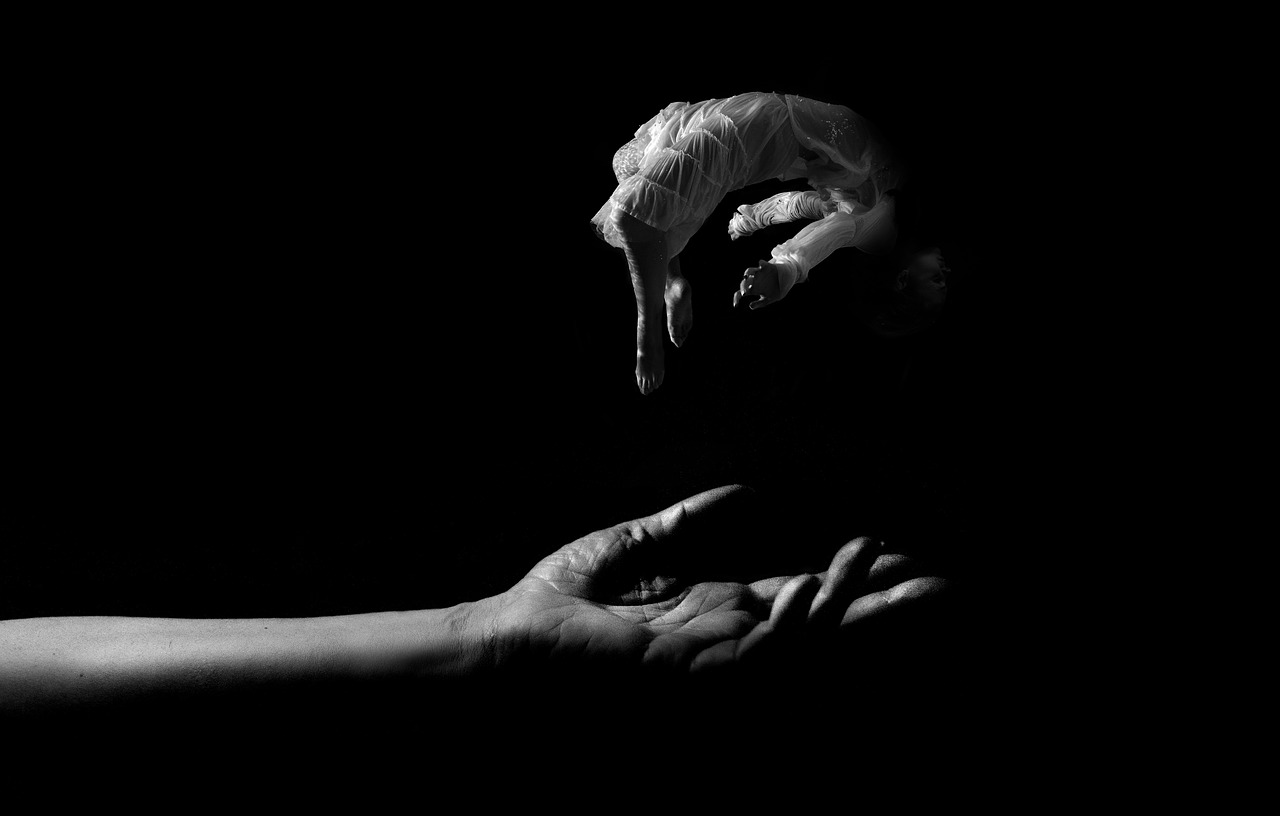
The Look and Objectification
In Jean-Paul Sartre's existential philosophy, the concept of "the look" plays a pivotal role in understanding how our perceptions of others—and their perceptions of us—shape our identities. Imagine walking down a busy street, feeling the eyes of strangers on you; that sensation is what Sartre refers to as "the look." It's that moment when you become aware that you are not just a solitary being but an object in the eyes of others. This realization can be both exhilarating and terrifying, as it highlights the tension between our desire for freedom and the constraints imposed by social interactions.
When someone looks at you, they are not merely observing; they are interpreting and judging. This interaction can lead to objectification, where an individual is reduced to a mere object, stripped of their subjectivity. Sartre argues that this objectification can limit our freedom, as we become overly concerned with how others perceive us. We might start to conform to societal expectations or alter our behaviors to fit into predefined roles, losing touch with our authentic selves in the process.
To illustrate, consider the following scenarios:
- Social Media Influence: In today's digital age, platforms like Instagram and Facebook amplify "the look." Users curate their lives to present a certain image, often leading to a distorted sense of self based on likes and comments.
- Workplace Dynamics: In professional settings, the way colleagues perceive you can influence your career trajectory. The pressure to conform to workplace norms may compel individuals to sacrifice their authenticity for acceptance.
- Public Spaces: When out in public, people often adjust their behavior based on the perceived judgment of others. This can manifest in everything from fashion choices to how we speak, ultimately shaping our identity.
However, acknowledging "the look" can also be liberating. By understanding that others' perceptions are subjective, we can reclaim our freedom. Sartre encourages us to embrace our existence as both subjects and objects, allowing us to navigate our identities with greater authenticity. Instead of succumbing to the pressure of objectification, we can choose to define ourselves on our own terms, embracing the complexities of our relationships with others.
In conclusion, "the look" is a double-edged sword. While it can lead to objectification and a loss of freedom, it also offers a path to deeper self-awareness. By recognizing how we are perceived and how we perceive others, we can forge more meaningful connections and live authentically in a world that often seeks to categorize us. It's all about finding that delicate balance between being seen and staying true to oneself.
- What is "the look" in Sartre's philosophy? "The look" refers to the awareness of being perceived by others, which can lead to objectification and impact our sense of self.
- How does objectification affect personal freedom? Objectification can constrain personal freedom by pushing individuals to conform to societal expectations and roles, leading them away from their authentic selves.
- Can recognizing "the look" be beneficial? Yes! By understanding how perceptions shape our identities, we can reclaim our freedom and choose to define ourselves authentically.

Interpersonal Relationships
In the realm of Sartre's existentialism, interpersonal relationships are not just mere connections; they are essential threads that weave the fabric of our existence. Sartre posits that our interactions with others significantly shape our identity and sense of self. Think about it: when you look in the mirror, do you see just your reflection, or do you also see the impressions left by friends, family, and even strangers? Each relationship acts as a mirror, reflecting back aspects of our personality and choices that we might not recognize on our own.
This idea of being defined by others can be both liberating and constraining. On one hand, our relationships can offer a sense of community and belonging, allowing us to explore our freedoms within a supportive environment. On the other hand, they can also impose limits on our autonomy. Imagine being in a group where everyone expects you to conform to their norms and values. In such scenarios, the freedom to express your true self can feel stifled. Sartre's exploration of these dynamics reveals a complex interplay between personal freedom and social expectations.
Moreover, Sartre introduces the concept of 'the look'—the way we perceive ourselves through the eyes of others. This 'look' can lead to objectification, where individuals are reduced to mere roles or labels in the eyes of others. For instance, consider how a person might be viewed solely as a parent, a student, or a professional, stripping away their multifaceted identity. This objectification can create a sense of alienation, as individuals may feel that they are not truly seen for who they are, but rather for what they represent in social contexts.
Interestingly, Sartre does not suggest that relationships are inherently negative; rather, he emphasizes the potential for growth and authenticity within them. When we engage with others authentically, we can enrich our understanding of ourselves and our choices. This authenticity requires vulnerability and the courage to express our true thoughts and feelings, which can sometimes lead to conflict. However, it is through these conflicts and resolutions that we can achieve a deeper sense of self-awareness and freedom.
In summary, Sartre's exploration of interpersonal relationships highlights the dual nature of human connections. They can either enhance our freedom or confine it, depending on how we navigate the complexities of our interactions. By recognizing the impact of others on our identity, we can strive for authentic relationships that foster both individual freedom and collective understanding. The challenge lies in balancing our own desires with the expectations of those around us, ultimately leading us to a more profound comprehension of our existence.
- What is Sartre's view on freedom in relationships?
Sartre believes that relationships can both enhance and restrict individual freedom, depending on how authentically one engages with others. - How does 'the look' affect our identity?
'The look' refers to the way we perceive ourselves through others' perceptions, which can lead to objectification and affect our sense of self. - Can relationships lead to existential growth?
Yes, authentic relationships can foster self-awareness and personal growth, despite the potential for conflict.
Frequently Asked Questions
- What is the essence of existentialism according to Sartre?
Existentialism, as defined by Sartre, emphasizes the importance of individual existence, freedom, and the choices we make. He argues that our essence is not predetermined; instead, it is shaped by our experiences and decisions. This philosophy encourages individuals to explore their identity through personal experiences and to embrace their freedom in defining who they are.
- How does Sartre connect freedom and responsibility?
Sartre posits that freedom is inherently tied to responsibility. With the ability to make choices comes the weight of those choices and their consequences. This relationship means that individuals must confront the moral implications of their actions and accept the responsibility that accompanies their freedom. In essence, freedom is not just about making choices but also about owning the outcomes of those choices.
- What does Sartre mean by 'bad faith'?
'Bad faith' is a concept introduced by Sartre to describe the act of self-deception. It occurs when individuals deny their freedom and responsibility by conforming to societal expectations or avoiding difficult choices. This denial can lead to a lack of authenticity in one's life, as individuals may choose to live in a way that is not true to themselves, ultimately escaping the burden of responsibility.
- Why is authenticity important in Sartre's philosophy?
Authenticity is crucial because it represents living in accordance with one's true self and values. Sartre argues that to achieve authenticity, individuals must engage in conscious decision-making and fully embrace their freedom. This means recognizing the weight of their choices and being honest with themselves about their desires and motivations, which leads to a more fulfilling existence.
- How do Sartre's ideas about freedom affect social structures?
Sartre's exploration of freedom extends beyond the individual to encompass social implications. He suggests that personal freedom is interconnected with societal structures and interpersonal relationships. This means that the way we interact with others can either enhance or restrict our freedom, shaping not only our identities but also the dynamics of the communities we inhabit.
- What role do others play in shaping our identity according to Sartre?
In Sartre's view, the presence of others is fundamental to our understanding of selfhood. Interactions with others can influence our perceptions of freedom and identity. For instance, being perceived by others can lead to feelings of objectification, which can impact how we see ourselves. These dynamics highlight the complex interplay between individual freedom and social relationships.



